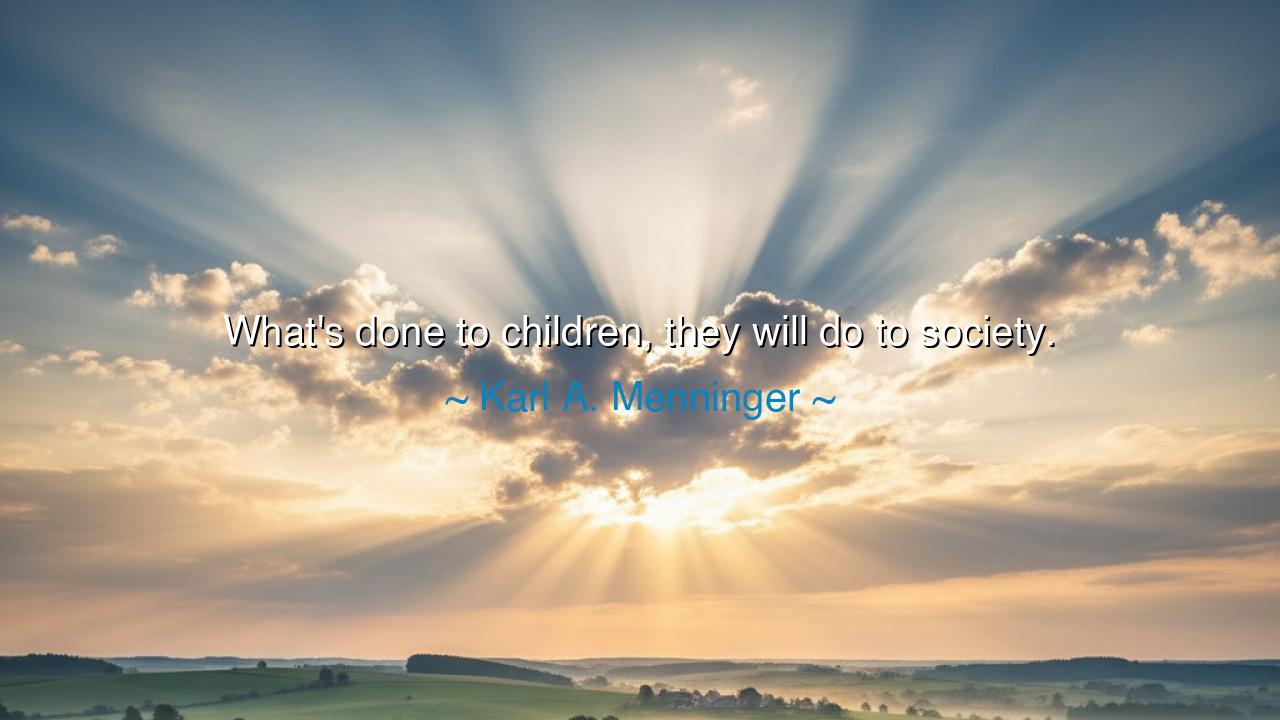
What's done to children, they will do to society.






Hear the piercing words of Karl A. Menninger: “What’s done to children, they will do to society.” This truth is as ancient as it is eternal, for children are not only the heirs of the world, they are also the mirrors of it. What they experience, they repeat; what they suffer, they inflict; what they are taught, they carry into the future. If love, dignity, and wisdom are given to them, society itself will be filled with these treasures. But if they are neglected, wounded, or hardened, their pain will spill outward, shaping the culture of tomorrow with scars of yesterday.
The ancients spoke of this principle. Aristotle taught that the habits instilled in youth determine the destiny of the city. Confucius declared that to renew a nation, one must begin with the character of the young. Even the poets of old warned that the cruelty of parents or rulers toward children would be repaid by generations. Menninger’s words are but a modern echo of this timeless teaching: the fate of a people rests not upon their wealth or armies, but upon how they treat their children.
History gives us examples both tragic and inspiring. Consider the Spartan system of upbringing. Boys were taken from their homes, hardened by discipline, and taught cruelty as strength. The result was a society both feared and admired, but one that eventually devoured itself in rigidity and war. Contrast this with Finland in the modern era, where investment in education, respect for teachers, and nurturing environments for children created not only individual success but a flourishing and innovative society. In both cases, Menninger’s warning proves true: what is done to the young is reflected back upon the whole.
The story of child labor in the Industrial Revolution offers another lesson. Children worked in factories and mines, deprived of education and childhood. They carried into adulthood broken bodies, bitterness, and limited opportunities. Society reaped what it had sown: waves of poverty, unrest, and despair. Only when reformers fought to protect children, to provide schools instead of sweatshops, did nations begin to heal and grow strong again. It was the treatment of children that determined the health of the community itself.
The meaning of Menninger’s words runs deep: a society that neglects or harms its children plants seeds of its own downfall. Abuse breeds violence; neglect breeds indifference; exploitation breeds corruption. But love breeds compassion, education breeds wisdom, and protection breeds justice. Children are not simply individuals to be raised—they are the soil in which the future of civilization is planted.
The lesson for us, O listener, is urgent and clear. If you would heal the world, begin with the children. Guard them fiercely from harm. Teach them truth, not lies; kindness, not cruelty. Show them that dignity belongs to every soul. Do not leave them to the cold embrace of neglect, nor allow greed to consume their innocence. For each child carries within them the blueprint of tomorrow’s society, and what you write upon their hearts today will be carved upon the world tomorrow.
Therefore, let Menninger’s words burn within you: “What’s done to children, they will do to society.” In your home, in your community, in your nation, let this be your guiding law. Protect them, nurture them, inspire them, and you will have already begun the work of building a just and noble society. Harm them, and you prepare your own ruin.
And so, let this truth be passed down through the generations: the destiny of the world is written first in the souls of its children. To uplift them is to uplift all. To wound them is to wound all. Guard them well, and the future will guard you in return.






AAdministratorAdministrator
Welcome, honored guests. Please leave a comment, we will respond soon